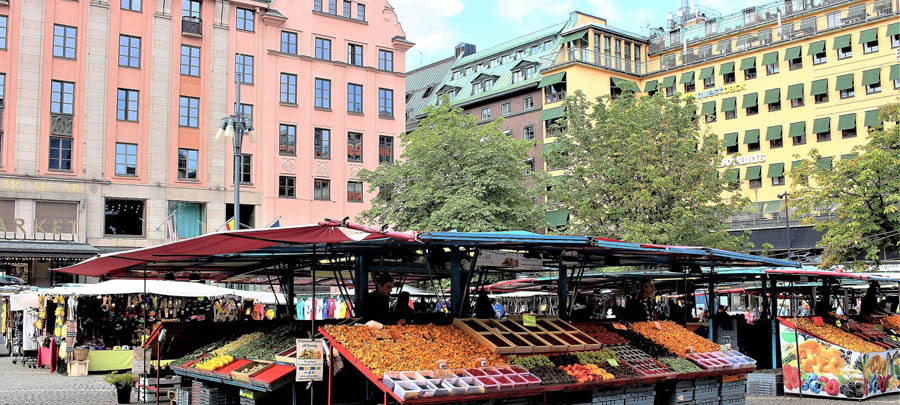Neutrality, openness, egalitarianism, focus on protecting the environment and diversity have defined the Swedish business culture, both in terms of organizational structure and management approach. This Nordic country is well connected to the rest of the world and has a strong system of food importers that fuel the diverse tastes of its population. Together with easy access to capital, well-developed infrastructure, high transparency, and economic and political stability make environmentally-conscious Sweden a paradise for business and innovation. In this article, we will analyze some of the main trends in the Swedish food market and focus on a number of food importers from Sweden.
SWEDISH MARKET DEMAND
Swedish food consumption consists of up to 90% of canned, frozen, and highly processed foods. The remaining part is composed of non-processed products, such as fresh fruit and vegetables, fresh fish, fresh meat, and eggs. Generally, products that are low in sugar, high in fiber, and low glycemic index have good potential on the Swedish market.
There is also a high interest in food products from other countries, especially for so-called ethnic foods, such as Italian, Chinese, Indian, and Mexican style products.
At the same time, interest in healthy food has expanded sales of products that are seen as nutritious, e.g. nuts, cereal grains, and health bars.
SWEDISH FOOD IMPORTERS AND FOOD TRENDS
As about 20% of the inhabitants in Sweden are foreign-born, in Swedish food stores, imports account for 50% of the total food in the shops.
The main food import is easily explained, consisting of food, which is not produced within Sweden such as citrus fruit, nuts, green coffee, tea, cocoa, spices & condiments, wine, oils & fats, chocolate & confectionary, cheese, and beverages, and also of products, which are only available during a part of the year.
Additional notable import items are fish & seafood products (including re-exports of farmed fish), sauces and dressings, ready-to-eat meals, certain canned, frozen and dried foods, as well as animal feed.
Sweden has been more or less self-sufficient in basic foods like meat, dairy products, and cereals, although, in recent years, the meat industry has become a large importer.
GREEN EFFORTS
Scandinavian lands rank high in terms of organic food sales and consumption in Europe. Sweden registers the third highest per capita spending on organic products worldwide. In Sweden, the organics’ market share reached 9.1%, with retail sales making €2.4 billion and continues to grow.
The Swedish government actively supports its citizens to be sustainable through urban farming. Since around 1990, organic cultivation has become an increasingly vital factor in the national agricultural strategy.
Moreover, several important market players within the retail, wholesale, and industrial sectors have in recent years invested in new product development and better marketing concerning a wide variety of organic food. As a result, product availability and growing health awareness set the trend for Swedish consumers to increasingly choose natural foods over the years.
EXTRAORDINARY POTENTIAL IN THE COFFEE MARKET
Sweden features among the highest per capita coffee consumption rates in the world, making it in the top 10 coffee consuming countries. The country scores over 1,700 coffee outlets and the number of micro-roasteries is continuously growing. These businesses cater to niche markets and practice direct trade based on strong long-term relationships and transparency. The growing demand lays in coffee with sustainability certifications.
Compared to other European countries, import volumes into Sweden are relatively low, reaching US$ 520 million in 2023, but are heavily focused on unique, high-quality coffees. Sweden remains an essential player for the coffee market in the region as the upward trend of out-of-home consumption in Scandinavia brings attractive opportunities for exporters of higher-valued coffee varieties.
FORECAST
Global trends like sustainability, food safety, and innovation set a solid basis for businesses and the right conditions for success in the food trade sector. Being aware of how these trends affect your business is a key ingredient to success.
3 Food Importers from Sweden :
- Food Trade Sweden
Address:Väderögatan 9a, Malmo
Phone: +46 40 608 61 75
Website: www.foodtrade.nu - Sbd Spices Import
Address: 6 Sjövägen
stolkhome, Uppsala län, 746 31
Phone:+46 73 948 18 20
Website: www.sbdspices.com - US Grocer Ab
Address:26 Sorterargatan
Vällingby, Stockholms län, 162 50
Phone: +46 10 207 11 50
Website: www.usgrocer.se
To get access to a list of more active food importers from Sweden, you can access one of the BestFoodImporters databases.
